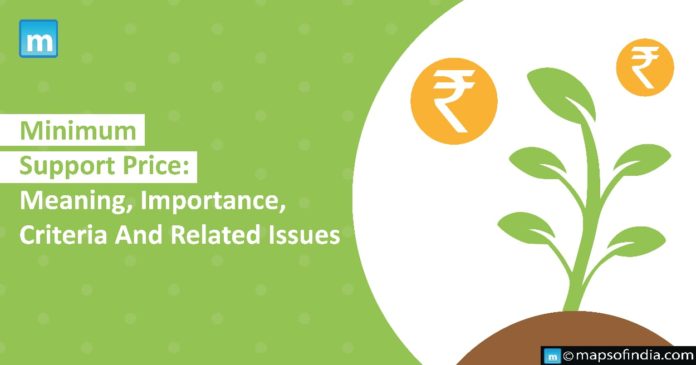The Minimum Support Price (MSP) is based on a computation of at least 1.5 times the farmers’ production costs, which is the amount at which the government agencies procure crops from farmers. A “minimum price” (MSP) is set for any crop the government deems to be profitable for farmers and, therefore, worthy of “support”.
MSP-recommended crops
The Commission for Agricultural Costs and Prices (CACP) proposes MSPs for 22 MSP-eligible crops and a fair and remunerative price (FRP) for sugarcane. The Ministry of Agriculture and Farmers’ Welfare has an associated office called CACP.
It includes 14 Kharif-season crops, six rabi-season crops, and two additional commercial crops as compulsory crops. Furthermore, the MSPs for dehusked coconut and toria are established based on the MSPs for copra and rapeseed, respectively.
Criteria for recommending the MSP
- When determining the MSP for a product, the CACP considers a variety of criteria, such as cultivation expenses.
- In addition to considering the commodity’s supply and demand modeling, domestic and international market price developments, parity with other crops, the effects of the commodity on consumers, the environment, and trade agreements between the agricultural and non-agricultural sectors are taken into account.
Three different types of production costs
The CACP calculates three distinct production costs for each crop at the state and national levels.
- A2: Pays for all direct expenditures the farmer makes for things like seeds, fertilizer, hired labour, pesticides, leased land, fuel, irrigation, and so on.
- A2+FL: This includes the cost mentioned above and an inferred value for unpaid family labour.
- C2: It is a more inclusive cost that, in addition to A2+FL, considers interest forgone on owned land, rents, and fixed capital assets.
- When advising MSP, CACP takes into account both A2+FL and C2 expenses.
- CACP estimates simply A2+FL as the return cost.
- However, C2 costs are primarily used by CACP as baseline reference costs (opportunity costs) to assess whether the MSPs they recommend at least handle these costs in some of the major producing states.
- The Union government’s Cabinet Committee on Economic Affairs (CCEA) makes a final determination about the MSP level and other suggestions given by CACP.
Why is MSP required?
Since 2014, farmers have been forced to endure falling commodity prices due to the severe droughts of 2014 and 2015. The rural economy, mainly the non-farm segment and agriculture, was devastated by the simultaneous shocks of demonetization and the introduction of Goods and Service Tax (GST).
The majority of farmers continue to be in a vulnerable condition as a result of the Corona outbreak. The rising cost of diesel, energy, and fertilizers only exacerbates the problem.
What are the problems related to India’s MSP regime?
- Confined extent: Despite the formal declaration of MSPs for 23 other crops, only two merchandise, rice and wheat—are procured since they are allocated via the National Food Security Act (NFSA). The rest is mainly incidental and pointless.
- Non-efficient Implementation: Only 6% of the MSP was received by farmers, according to a 2015 review by the Shanta Kumar Committee. That means that the MSP does not benefit 94% of agriculture producers in the nation.
- Act as a Procurement Price: The present MSP regime has no impact on pricing in the domestic market, making it more of a procurement price. Due to its primary purpose of satisfying NFSA criteria, it does not serve as an MSP but functions as a procurement price.
- Makes wheat and paddy dominant in Agriculture: The overproduction of rice and wheat caused by the skewed MSP system inhibits farmers from growing other crops and horticultural products, which have higher demand and may, therefore, boost farmers’ income.
- The difficulty for smaller farmers: The MSP-based purchasing system depends on intermediaries, commission agents, and APMC officials, all of whom are difficult for smaller farmers to contact.




